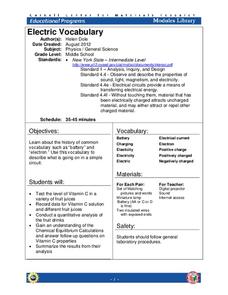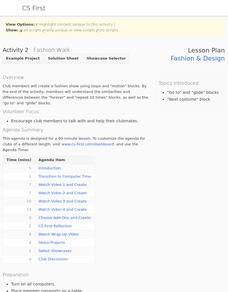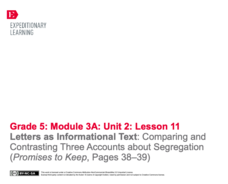Curriculum Corner
Book Study: The Polar Express
All aboard! Pair a reading of The Polar Express by Chris Van Allsburg with a set of literacy activities. The packet of worksheets includes task cards, sorting activities, a synonym match, comparing and contrasting activities, writing...
CK-12 Foundation
Logarithm Properties: The Log Properties
Roll a log into an equivalent expression. Given four expanded logarithmic expressions, pupils write an equivalent condensed expression. They identify which properties allows for the simplification.
Cornell University
Electric Vocabulary
Practice electric vocabulary using multiple methods. Learners begin by watching a video that explains vocabulary related to electric currents. They match vocabulary cards to practice and then create an electric circuit. Using the...
K20 LEARN
Transformers Part 1 - Absolute Value and Quadratic Functions: Function Transformations
Transform your instruction with an exploratory lesson! Young scholars manipulate absolute values and quadratic functions to look for transformation patterns. They use the patterns to write general rules of transformations.
National Park Service
A Tale of Two Men
Theodore Roosevelt and the Marquis de Mores were both born in 1858, and both came to the Dakota territory in 1883, but they influenced the developing country of America in different ways. Elementary and middle schoolers apply written and...
PBS
Thomas Paine: Writer and Revolutionary
Is the pen really mightier than the sword? Scholars analyze the impact Thomas Paine's book Common Sense had on the American Revolution. Video clips and primary sources investigate the role Paine had on dissent in the colonies....
PBS
Harriet Beecher Stowe: Author and Abolitionist
Scholars use primary documents, video clips, and legal decisions to uncover Harriet Beecher Stowe's motives for writing Uncle Tom's Cabin. They create a 21st century book jacket for the novel to capture the purpose behind Stowe's...
PBS
Booker T. Washington: Orator, Teacher, and Advisor
Imagine teaching yourself to read and write—do you think you could do it? Scholars analyze how Booker T. Washington went from a slave learning to read to a leading educator in the United States. Using video clips, speeches, and primary...
PBS
Mark Twain: Storyteller, Novelist, and Humorist
Scholars investigate the use of satire in Mark Twain's writing. Literary lovers research the Adventures of Huckleberry Finn and Tom Sawyer, political cartoons, and videos to see how Twain uses satire to make the stories more memorable....
Indiana Department of Education
Indiana K-12 Educators’ Resource Toolkit
Imagine a tool that magically engages readers in the classroom. A handbook for Indiana educators doesn't guarantee success, but it does offer a variety of strategies for teachers to try. The handbook opens with research-based theory...
Google
Fashion and Design: Fashion Walk
Strut your stuff, just on a computer and not on a fashion runway. Scholars program a fashion show animation using block-based computer coding. They learn how to apply different code blocks in writing their programs.
Open Oregon Educational Resources
How to Learn Like a Pro!
What's the best way to ace an exam or pass a difficult class? Scholars find out using an information-packed eBook. Pupils read about learning styles, study skills, test-taking strategies, and other topics associated with maximizing...
EngageNY
Grade 10 ELA Module 2: Unit 3, Lesson 4
It is, and it is not. Scholars examine how these words impact Eleanor Roosevelt's speech, in which she tries to persuade the adoption of the Universal Declaration of Human Rights. Readers note rhetoric and figurative language. They then...
PBS
Stereotypes vs. Statistics (Grades 9-12)
What is a common stereotype people may think about you; is it true? Using a thought-provoking lesson, high schoolers analyze common stereotypes of the Latino-American population versus statistical data. Scholars review data and...
EngageNY
Grade 10 ELA Module 4, Unit 2, Lesson 25
How do film adaptations differ from their literary counterparts? Scholars watch and analyze the 2011 Royal Shakespeare Company (RSC) production of Shakespeare's Macbeth. Pupils complete a Quick Write analyzing how the RSC production...
EngageNY
Grade 11 ELA Module 1: Unit 3, Lesson 2
What was life like for William Shakespeare's sister, Judith? Scholars continue reading Virginia Woolf's A Room of One's Own to find out. They complete a Quick Write to explain how Woolf's comparison of the siblings develops a central...
EngageNY
Grade 11 ELA Module 2: Unit 1, Lesson 25
While preparing for the end-of-unit assessment, scholars look at Washington's "Atlanta Compromise" speech and identify the terms he used in the argument. They also identify the relationship between the claims presented in the speech and...
EngageNY
Building Background Knowledge: Small-Group Work to Learn More about the History of Wars in Vietnam
Scholars take a close look at "The Vietnam Wars." They answer questions and discuss in groups to conclude that the author respects the Vietnamese. They participate in a modified jigsaw discussion and end the exercise with a quick writing...
Curated OER
Remembering the Fallen
A thought-provoking lesson showcases Civil War battlefield monuments to demonstrate how fallen soldiers are remembered. High school scholars compare Union and Confederate monuments to learn how each group commemorated the battles. They...
K20 LEARN
Government Power: Do the Actions of Government Effect Me?
What does the government have to do with getting a driver's license? Including the calorie count for a meal on a restaurant menu? By discussing these kinds of questions and researching how concepts behind federal, state, and local...
EngageNY
Using Multiple Resources of Information: Creating a Cascading Consequences Chart about DDT and Practicing a Fishbowl Discussion
For every action there is a consequence. Scholars continue their work on creating a cascading consequence chart about DDT using Welcome Back, The Exterminator, Rachel Carson: Sounding the Alarm on Pollution along...
EngageNY
Letters as Informational Text: Comparing and Contrasting Three Accounts about Segregation (Promises to Keep, Pages 38–39)
Letters ... a lost art or good resource? Scholars add letter writing to their informational text chart and describe the features of a letter. They then look at page 38 in Promises to Keep and complete a Perspectives Venn...
Smithsonian Institution
Science Starts With a Question: Energy - Teacher Guide
Get an up-close look at energy transfer. Using a three-part activity, investigators first observe a teacher-led demonstration before building a model marble track to convert potential energy to kinetic energy. Scientists explore six...
Texas Education Agency (TEA)
Mistake, Misrepresentation, and Fraud
Fraud alert! Scholars conduct research about consumer fraud and create a presentation detailing the information they find. Additionally, they research and write a report about lawsuits that resulted in large settlements.

























